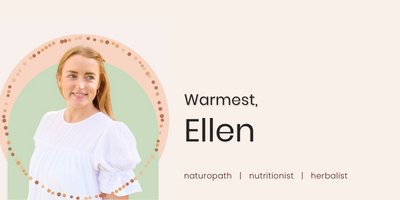Does dairy affect periods?
Have you ever noticed when you eat certain foods they make you feel yucky or not your best? I am sure that many of you may have experienced a period of this when you're not eating how you normally would like too.
But did you know that the foods you eat can impact your menstrual cycle?
The diet can impact the symptoms you experience throughout the month and during the monthly bleed. The menstrual cycle is an important indicator of your overall health, so much so, that some consider it to be our 5th vital sign! Eating a diet rich in vegetables, fruits and whole foods is key for overall health and menstrual health. Some people also see significant improvements of their period pain and other issues with their periods when following a gluten free diet. Dairy is also a common food group that can affect some peoples periods.
How does Dairy affect periods?
When humans consume dairy, more specifically, cow’s milk protein, it can increase insulin and insulin-like growth factor-1 (IGF-1).
The IGF-1 from cows is identical to the IGF-1 in humans, so it acts the same inside the human body (1). IGF-1 has a role in growth in various tissues and organs in the body. So how does IGF-1 affect periods? IGF-1 can stimulate the synthesis of hormones- it has been associated with the development of high androgens (1). Andogens are the male sex hormones. High levels of androgens in females is a key feature of PCOS. High androgens is what drives the common symptoms of PCOS. Those with PCOS experience irregular periods- it affects approximately 21% of women (2). It is common for those women to have elevated IGF-1 and insulin.
Interestingly, one of the mechanisms for metformin, a common medical treatment for PCOS and insulin resistance, is to reduce IGF-1 (3). If we can prevent the high levels of IGF-1 in the first place by reducing dairy intake, could it be worth trying instead of opting for medications?
What about lactose free milk?
Lactose free is beneficial for those who are lactose intolerant, but the problem with dairy is commonly due to the A1-casein protein and not lactose (4). In some people, the A1-casein can cause irritation in the gut and initiate an inflammatory response (4,5). Inflammation is not always a bad thing, it is one of the body’s mechanisms to protect us. But when the body is in an inflammatory state it can worsen the effects of normal inflammatory processes. During an inflammatory response it releases inflammatory cells like mast cells and histamine. So why is this an issue? High levels of these cells circulating can worsen period pain and cause heavy periods. Additionally mast cells release histamine:
Histamine is inflammatory, and inflammation worsens period pain.
Histamine stimulates oestrogen, high oestrogen can cause heavy periods.
Histamine increases contractility of muscles and dilation of blood vessels- increasing the flow of blood and pain to your uterus.
A2 milk is generally better tolerated (4) and is found in dairy from Jersey cows, sheep and goats.
Do I need dairy for my bones?
Milk and dairy is often associated with ‘strong bones’. Yes we definitely need calcium for strong bones. However, there are PLENTY of other food sources that contain adequate amounts of calcium other than milk. In fact, just 2 tbsp (30g) of chia seeds gives you more calcium than 1 glass(250ml) of milk (6).
I have seen significant improvements in my clients period concerns after implementing a dairy free diet. It is not always needed in all cases. However, it is a simple approach that you can start immediately and could be worth trying to see improvements in your PCOS symtpoms and also for heavy and painful periods.



